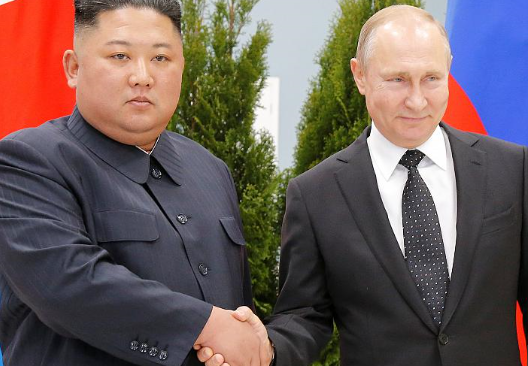
April 25, 2019
(Jerusalem, Israel) — North Korea’s “Dear Leader” Kim Jong Un arrived yesterday in the far-Eastern Russian city of Vladivostok to hold his first-ever summit with Russian Czar Vladimir Putin, having made the lengthy journey onboard a bulletproof train.
The reason for the meeting: to forge a far closer ties between Moscow and Pyongyang, complicate U.S. efforts to bring about peace between North and South Korea, and ostensibly for Putin to persuade his colleague to “denuclearize.” The prospects of these two powers drawing closer should be worrisome to anyone paying attention to Putin’s efforts in recent years to build a far broader and more aggressive anti-American and anti-Western front.
What struck me in particular was that the headlines of the last 24 hours seem ripped right out of the pages of The Kremlin Conspiracy and The Persian Gamble, in which a Russian-North Korean military and political alliance plays a central role.
Consider the following excerpt from Kremlin:
It quickly became apparent where they were heading—Vladivostok, site of Russia’s largest naval base, located on the Sea of Japan at the extreme southeastern corner of the Russian Empire.
Defense Minister Petrovsky explained that he had ordered his staff to arrange the trip on the premise that he would be conducting a surprise inspection of the submarine fleet that constituted the bulk of Russia’s ability to project power into the Pacific. Petrovsky would, in fact, do just that, accompanied by Zakharov. But the real purpose of the trip was something entirely different.
Once in Vladivostok, Russian President Alexander Luganov, FSB Chief Nimkov, and senior advisor Oleg Kraskin would be driven to a secret military facility where they would have dinner with the reclusive leader of North Korea, who would be arriving by train.
“Why by train?” Luganov asked.
“He is petrified of flying, Your Excellency.”
“How far is that journey?”
“Almost five hundred miles.”
Oleg stopped writing for a moment and looked at Petrovsky. Five hundred miles by train? he wondered, though he said nothing….
Oleg could have written a book about the absolutely bizarre eccentricities of the North Korean dictator he observed during the two-hour meeting between the two leaders, from what he wore to what he ate to how he expressed himself. But what truly disturbed Oleg was how close Luganov seemed to be to this madman. Oleg had never participated in—much less created a transcript of—a single call between the two leaders. Yet the evidence suggested the two men had spoken dozens of times over the past few years. They clearly had a history together, and they were using a personal shorthand to build their framework for an entirely new bilateral relationship.
At first, none of it computed. On the plane, Petrovsky had advised Luganov on ways to persuade the North Koreans to end their nuclear weapons program and enter into a new round of six-party peace talks with South Korea, China, Japan, Russia, and the United States. Luganov had acted as if he fully agreed with his defense minister. But once Petrovsky left the room, it became obvious that defusing the North Korean threat was not Luganov’s objective at all.
As Oleg took notes during the meeting between the two heads of state, it was clear that Luganov was trying to clandestinely flip Pyongyang’s allegiance from Beijing to Moscow. In so doing, he seemed willing to help Pyongyang become a regional powerhouse ready and able to intimidate and even dominate Seoul, Tokyo, Taipei, and everyone else in the Pacific Rim. To accomplish this, Luganov offered to cancel North Korea’s $11 billion debt to Russia and provide some $2 billion in new Russian grain shipments. That’s why, Luganov said, he’d persuaded five oligarchs to be prepared to invest upward of $25 billion in developing North Korean natural resources like coal and iron ore over the next decade. That was also why Luganov was offering Moscow’s technical assistance with helping Pyongyang build ballistic missiles capable not only of carrying nuclear warheads but of reaching the continental United States.
Luganov’s chilling offers were immediately accepted, but there was more to the conspiracy the two leaders were concocting. They agreed that to throw the West—as well as Beijing—off the scent, Russia would publicly and forcefully condemn Pyongyang’s ongoing nuclear weapons tests. They even wrote the press release together. What’s more, they agreed that Russia’s Foreign Ministry would actively support additional economic sanctions against North Korea at the U.N. Security Council meeting later that month.
It would all be a show. The “Guiding Star” couldn’t have made himself more clear that he eagerly sought to be the Pacific arm of a “rising new Russian Empire.” He agreed to fully share the results of North Korea’s ICBM testing with scientists from Tehran in order to help the Islamic Republic of Iran become the Middle Eastern arm of the new Russian Empire. Then, in the final minutes of their time together, the two men lowered their voices and somewhat cryptically agreed to be helpful to each other on “additional projects of mutual concern.” Oleg wasn’t sure what they meant. Nor was he certain he wanted to know. But he dutifully wrote down every word he heard through the official translator and kept his mouth shut….
No comments:
Post a Comment